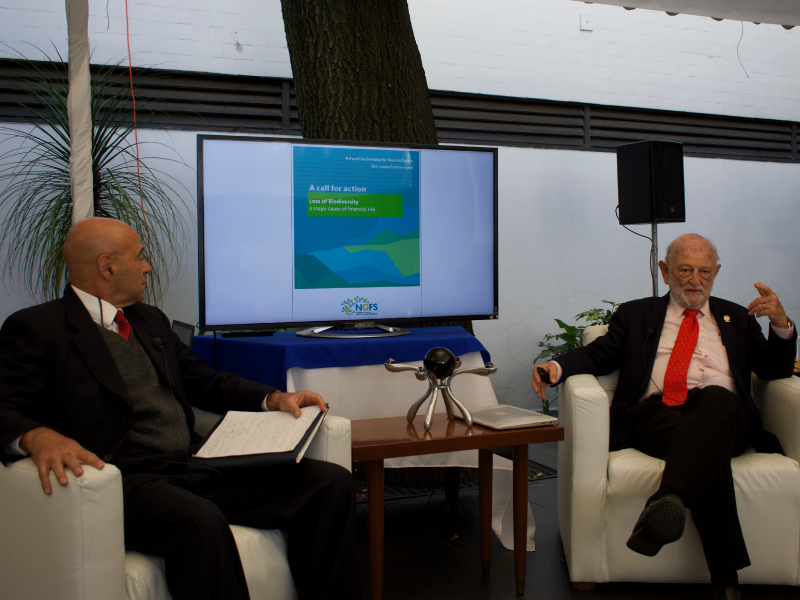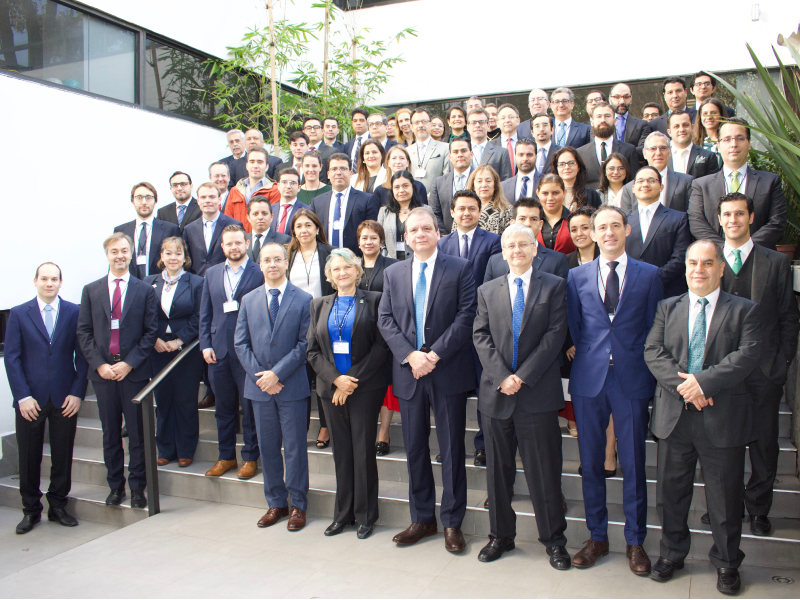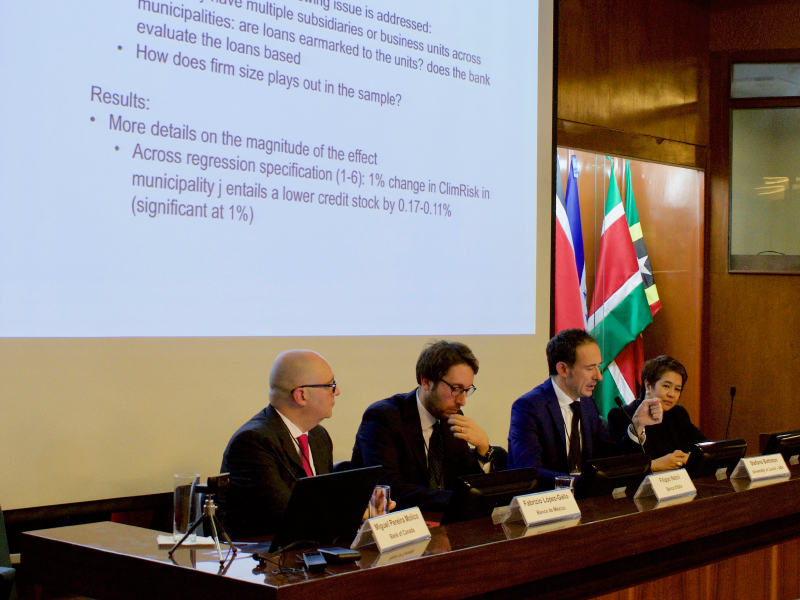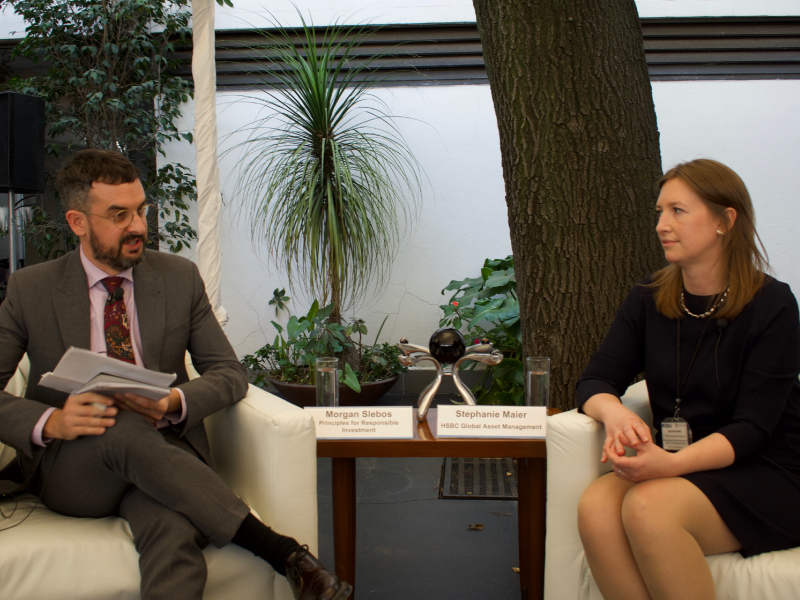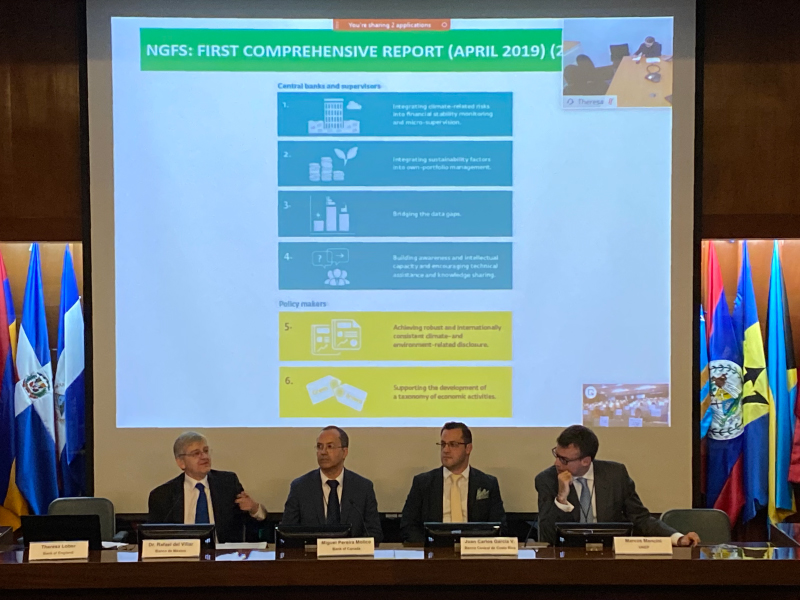Conference on Climate Change and its Impact in the Financial System
Mexico City, Mexico, December 5–6, 2019
Dialogue with members of the Central Banks and Supervisors Network for Greening the Financial System (NGFS)
The purpose of the NGFS dialogue was to enhance the role of the financial system to manage risks and to allocate capital for low-carbon and green investments that meet an environmentally sustainable development. Also the NGFS discussed on its practices currently being implemented within and outside its Membership, having as an overall objective, the strengthening of a global response required to meet the Paris Agreement goals.
Academic Papers Session I
The first academic session of the Conference was devoted to introduce to attendees evidence on the impact that climate risks (physical and transactional) has on the Financial System as well as different approaches to assess it.
The paper Impact of Extreme Weather Episodes on the Philippine Banking Sector: Evidence Using Regional Branch-Level Data, showed the negative effect produced by extreme rain episodes on banking sector performance. They constructed a regional rainfall damage index (RDI) and implemented a Dynamic Panel along with a Panel Structural VAR in order to measure the impact. They found that extreme rainfall events have direct negative impact on growth of total loans, total deposit liabilities, net profit and return on assets.
Next, in the paper “Climate risk and financial stability in the network of banks and investment funds, they employed an innovative method to analyze the effect on Financial Stability of the interplay between shocks in climate policy and different market conditions. It was observed that under mild shock scenarios, systemic losses are contained. Also, they identified climate policy scenarios and market conditions under which systemic losses can pose a threat to financial stability.
Finally, “Climate change and bank lending: the case of flood risk in Italy” presented a study of bank lending to firms under risk of flooding. Following a municipal level approach using a map of flood risk areas and developing the ClimRisk indicator, after regression analysis they found that banks are aware of climate-related catastrophe risk and considers it ex-ante, rationing credit to risky firms, independently of credit demand factors and disaster insurance coverage.
Policy Panel I
First policy panel’s purpose was to gain insight on the ongoing work that credit institutions are carrying out greening the banking system, more precisely, i) the measures currently being taken in order to achieve it, ii) the main reasons why credit institutions should get involved in the task of moving toward a lower carbon economy, and iii) the principal barriers they currently face.
Academic Papers Session II
The second academic session deepen on the impact produced by weather phenomena (physical risks), as oceans warming and tropical cyclones, on different economic activities like food production, manufacturing and services.
The first paper “Efectos Macroeconómicos de El Niño en Costa Rica” explored the effect of the climate phenomena “El Niño” (ENSO) on production and price fluctuations. With the use of macroeconomic data and the Multivariate ENSO Index, which measures atmospheric pressure at sea level, wind direction, temperature on the surface of the ocean and cloudiness; they found evidence that the imbalance of rainfall across Costa Rica generates losses of products due to the drought in some parts of its country and flooding in others, that has as consequence an increment in prices.
Continuing with the session, the paper “The Effect of Tropical Cyclones in Economic Activities: Micro Level Evidence from Mexico for Secondary and Tertiary Activities”, presented a study on the effects of tropical cyclones (TC) on economic activity at firm level. They implemented an Augmented Distributed Lagged Model in order to determine the impact produced by cyclones; the study found that for average firms, the exposure to TC generates negative and persistent effects on production and real remuneration per worker.
Next, “Nonlinear relationship between the weather phenomenon El Niño and Colombian food prices” estimated the impact of “El Niño” for its own jurisdiction, on food inflation growth using a nonlinear transition regression model. The work findings were that a strong “El Niño” shock has on average significant effects on food inflation in a time period of eight months after the event, but no evidence was found in the size of Colombian food inflation growth over longer periods. Also results suggested that weather shocks are asymmetric on food inflation.
Policy Panel II
The second policy panel: Research and policy papers, aimed to shed light upon the research currently being developed on climate change, green finance and the economy. Its main challenges are the role of regulators to promote research on these topics and the data gaps that need to be closed in order to boost the study of these issues.
Policy Panel III
The third policy panel: The role of Institutional Investors and Asset Managers, had the purpose of exploring the role that institutional investors and asset managers can take to mobilize resources for green investments. In more detail, the reasons why institutional investors and asset managers should support solid environmental investments, current actions being taken by the latter for greening and decarbonizing their portfolios, and the measures that regulators are currently taking in order to accelerate resource mobilization towards greener activities.
Academic Papers Session III
Last academic session was focused in a mire general review of the impact of Climate Change on the Financial System. For this end, the topics addressed were sustainable investment and exposure of investors, Environmental, Social and Governance (ESG) metrics and the impact of climate risk on market indexes.
Firstly, the paper “The Exposure of Institutional Investors to Environmental Risks: A Study Focused on the Management of International Reserves (IRs) by Central Banks” addressed an approach to implement Environmental Risk Analysis (ERA), this by the development of a multicriteria analytical framework for the strategic asset allocation of the IRs. They found that each viable portfolio should be evaluated under an ERA framework, considering scenarios of environmental risks along probabilities and potential impacts; such an approach is relevant for the construction of IRs portfolios given its consideration of different angles that must be consider in order to select countries and instruments.
Then, “Mind the gap, Machine learning ESG metrics and sustainable investing”, proposed a novel approach to overcome the current inconsistencies in the ESG scores by using a Machine Learning model-free approach to identify those indicators that could better contribute to the construction of efficient portfolios taking into consideration social and environmental aspects for the construction of portfolios. They found that among the ESG indicators selected, half of them were environmental and some refer to companies’ exposure and ability to move forward adaptation techniques (like renewables and clean technologies) and manage climate change risk, namely transition risks.
The last paper presented “Measure of the Impact of Climate Risk on Market Indexes Through the Implementation of a Model CoVaR” focused on the development of climate risk indicators that can be used by financial institutions and regulators as a tool for quantifying and monitoring systemic risk coming from climate change; its work targeted indexes as Banking, oil and gas, food processing, insurance, leisure and hotels. Using a CoVar approach, results show that, along with other systemic risk indicators, climate variables can contribute quantifying the transmission channels and understanding the risks that threaten the stability of the Moroccan financial system.
Policy Panel IV
The fourth policy panel: Taxonomies and Recommendations, aimed to investigate the role of taxonomies in the transition to an environmentally sustainable financial system. It was debated the types of taxonomies that have already been developed globally and their application to the identification of green products. Also, it was discussed the specific needs of the Mexican financial markets and the necessary convergence to the most widely accepted global taxonomies.
Policy Panel V
The last policy session: International Cooperation and Capacity Building, has the purpose of explaining how the international cooperation and capacity development could be fundamental to enhance the greening of the financial system, discussing examples of international cooperation with high impact, describing the type of capacities needed to build and the role that multilateral organizations can play in order to mobilize resources towards green projects.
Day 1
Welcome remarks by Manuel Ramos Francia, Director General, CEMLA ![]()
Dialogue with members of the Central Banks and Supervisors Network for Greening the Financial System (NGFS)
Dialogue moderated by: Marcos Mancini, UNEP
- Rafael del Villar, Banco de México
- Theresa Löber, Bank of England
- Miguel Molico, Bank of Canada
- Juan Carlos García Vargas, Banco Central de Costa Rica
Academic Papers I
Moderated by: Fabrizio López-Gallo, Director General de Estabilidad Financiera, Banco de México
Impact of Extreme Weather Episodes on the Philippine Banking Sector - Evidence Using Regional Branch-data ![]()
Veronica B. Bayangos, Rafael Augusto D. Cachuela and Fatima Lourdes E. Del Prado (Central Bank of Philippines)
Comments by Juan Carlos Belausteguigoitia
Climate risk and financial stability in the network of banks and investment funds ![]()
Alan Roncoroni, Stefano Battiston, Luis Onésimo Escobar and Serafín Martínez Jaramillo (University of Zurich, Banco de México and CEMLA)
Comments by Miguel Molico, Bank of Canada
Climate change and bank lending the case of flood risk in Italy ![]()
Ivan Faiella and Filippo Natoli (Bank of Italy)
Comments by Stefano Battiston, University of Zurich
Conversation with Stephanie Maier, Director of Responsible Investment of HSBC Global Asset Management (Interviewed by Morgan Slebos from Principles for Responsible Investment) ![]()
Policy Panel 1: Greening the Banking System
Panel moderated by: Gianleo Frisari, Climate Change, IADB
- Ángel Manuel O’Dogherty, Deputy General Director, FIRA-BM
- Mariuz Calvet, Sustainability Director, BANORTE
- Alan Gómez, Sustainability Deputy Director, CitiBanamex
- María Eugenia Sosa Taborda, LAC Coordinator, UNEP FI
- Marcela Espinosa, Sustainability Director, Banco Santander México
Academic Papers II
Panel moderated by: Stefano Battiston, University of Zurich
Macroeconomic Effects of El Niño in Costa Rica![]()
Jorge León (Banco Central de Costa Rica)
Comments by Serafín Martínez, CEMLA
The Effect of Tropical Cyclones in Economic Activities: Micro Level Evidence from Mexico for Secondary and Tertiary Activities ![]()
Miriam Juárez-Torres and Jonathan Puigvert-Angulo (Banco de México)
Comments by Rafael del Villar, Banco de México
Nonlinear relationship between the weather phenomenon El Niño and Colombian food prices ![]()
Davinson Stev Abril-Salcedo, Luis Fernando Melo-Velandia and Daniel Parra-Amado (Banco de la República de Colombia)
Comments by Serafín Martínez, CEMLA
Conference on Climate Change and its Impact on the Financial System ![]()
Remarks by Alejandro Díaz de León, Governor, Banco de México
Day 2
Policy Panel 2: Research and Policy Papers
Panel moderated by: Rafael del Villar, Banco de México
- Marcos Mancini, UNEP
- Satyajit Bose, Program in Sustainability Management, Columbia University
- Gianleo Frisari, Climate Change, IADB
- Daniel M. Schydlowsky, Boston Institute for Developing Economies and Global Development Policy Center, Boston University
Policy Panel 3: The role of Institutional Investors and Asset Managers
Panel moderated by: Eduardo Piquero, MéxiCO2
- Clare Murray, 2° Investing Initiative
- Morgan Slebos, Director of Responsible Investment Programmes, PRI
- Jonás Hernández, Senior Associate, MSCI
- Luis Mejía, BlackRock
Conversation with Dr. José Sarukhan, President National Commission of Biodiversity, CONABIO (interviewed by Juan Carlos Belausteguigoitia) from ITAM ![]()
Academic Papers III
Panel moderated by: Serafín Martínez, CEMLA
The Exposure of Institutional Investors to Environmental Risks: A Study Focused on the Management of International Reserves by Central Banks
Viviane Torinelli and Antônio Francisco de Almeida da Silva Júnior (Universidade Federal da Bahia, Brasil)
Comments by Juan Carlos García Vargas, Banco Central de Costa Rica
Mind the gap, Machine learning ESG metrics and sustainable investing
Ariel Lanza (Kellogg SM- Northwestern University), Enrico Bernardini, Directorate General Markets and Payment System and Ivan Faiella (Bank of Italy)
Comments by Stefano Battiston, University of Zurich
Measure of the Impact of Climate Risk on Market Indexes Through the Implementation of a Model CoVaR
Mehdi BAZZI and Oussama ESSAMARI (Central Bank of Morocco)
Comments by Juan Carlos García Vargas, Banco Central de Costa Rica
Policy Panel 4: Taxonomies and Recommendations
Panel moderated by: Ernesto Infante Barbosa, Banco de México
- Brenda Ciuk, General Director for International Affairs, SHCP
- Gilberto Pérez, General Director for Regulatory Policy, CNBV
- Alba Aguilar, Consejo Consultivo de Finanzas Verdes
- Santiago Lorenzo, Climate Action Network International (consultant for GIZ)
Policy Panel 5: International Cooperation and Capacity Development
Panel moderated by: Patricia Moles, ITAM
- Jasmin Fraatz, Coordinator of the Climate Change Cluster, GIZ México
- Gabriela Rodríguez, UK Embassy in Mexico
- Emilio Uquillas, Director, CAF México
- Antonio Lloret, ITAM
- Jean Baptiste Sabatié, Director, AFD México
Concluding remarks by Rafael del Villar (Banco de México) and Serafín Martínez (CEMLA).
The Conference aimed to shed light firstly, in the ongoing work from the Academia in order to assess the impact that weather and transactional risks has on aspects of the financial system as prices, inflation, portfolio management, among others. Secondly, a policy perspective were taken, showing the current measures being taken in order to green the Financial System.
Dr. Veronica B. Bayangos
Director, Supervisory Policy and Research Department, Financial Supervision Sector, Bangko Sentral ng Pilipinas
Dr. Veronica B. Bayangos has been the Director of the Supervisory Policy and Research Department or SPRD since 2018. SPRD is the policy and research department of the Bangko Sentral’s Financial Supervision Sector. SPRD is mainly responsible for the review of existing supervisory rules and regulations and banking practices, and development of new policies aligned with the Bangko Sentral’s regulatory and supervisory frameworks and internationally-accepted standards and best practices. Prior to SPRD, Dr. Bayangos was the Director of the Center for Monetary and Financial Policy or CMFP for three years. She was also a Visiting Research Economist at the Bank of International Settlements, Hong Kong SAR in 2016.
Dr. Bayangos joined the Bangko Sentral in 2008 as Senior Economist in the CMFP. She holds an MA and PhD in Development Economics from the Institute of Social Studies of the Erasmus University in Rotterdam, The Netherlands. She is a member of the Advisory Committee in the BSP. She is also a member of the Netherlands Research Council. Her published works cover the areas of empirical macro and international economics, monetary, microprudential and macroprudential policies, macroeconometric modeling and forecasting.
Dr. Stefano Battiston
Professor of Banking,
University of Zurich
Stefano Battiston is Professor of Banking at the University of Zurich and Director of the FINEXUS Center for Financial Networks and Sustainability. He is a leading scholar in the field of systemic risk and sustainable finance. He has made advances in the scientific understanding of the relation between financial interconnectedness, complexity and risk. He has also directed a new and growing stream of research on climate-related financial risk.
He has co-authored 50+ publications including on top journals such as PNAS, Nature Communications, Nature Climate Change and Management Science. His scientific background in complex systems, combined with 15 years of research in economics and finance, put him in a unique position to understand policy issues both from a quantitative and holistic perspective.
He has also been coordinating several EU and Swiss projects on finance and sustainability. In particular, between 2014 and 2018 he has been the coordinator of the EU Future Emerging Technologies projects SIMPOL and DOLFINS investigating how to improve financial stability and how to better channel finance towards sustainability in a networked economy.
Filippo Natoli
Economist
Economics and Statistics Deptartment
Bank of Italy
Filippo Natoli works as an economist at the Research department of the Bank of Italy since 2011. In the International Economics Directorate, Filippo analyzes the economic development of advanced economies and makes research on the topics of macroeconomics, international finance and commodities. Since 2016, Filippo actively participates to the international debate on sustainable finance and he is engaged in a research project on the economic effects of climate change. Filippo holds a PhD in economics from LUISS University of Rome, Italy.
Jorge León Murillo
Economic Research Department
Banco Central de Costa Rica
Work in the Economic Research Department at the Central Bank of Costa Rica since 2009. Main focus of the research is Macroeconomics, Monetary Policy, Dynamic Stochastic General Equilibrium Models and Computable General Equilibrium Models and Climate Change. Member of the Strategic Analysis for Climate Change (GAECC) of the Central Bank of Costa Rica. MPhil in Economics at Università L. Bocconi. Milan, Italia. MSc in Economics at Università L. Bocconi. Milan, Italia. Bachelor in Economics at Universidad de Costa Rica. San José, Costa Rica
Miriam Juárez Torres
Deputy Manager of Statistical Analysis
Banco de México
Miriam Juarez Torres is an agricultural economist that got her PhD in Agricultural Economics from Texas A & M University. Currently she works as a Deputy Manager of Statistical Analysis in the Directorate of Analysis of Prices, Regional Economy and Information of the Bank of Mexico where she performs regional economic research of diverse topics. Her professional experience includes the Ministry of Foreign Affairs of Mexico and National Development Banking Institutions such as Financiera del Desarrollo. In international organizations, she has worked for the UN Economic Commission for Latin America and the Caribbean (ECLAC) and as a consultant for the Inter-American Development Bank. Miriam has academic publications in international refereed journals on topics such as climate change, price formation, price volatility and food security; in 2012 she won first place in the Banamex Economics Research Award and in 2015 she got an honorific mention in the best contributed paper for the International Association of Agricultural Economists Triennial meeting.
Daniel Parra-Amado
Junior Researcher
Banco de la República (Colombia)
Daniel Parra is an Economist and Master in Applied Mathematics and Master in Economics from the National University of Colombia. He has been working at the Central Bank of Colombia for 11 years. He was a senior advisor of the Governor and the Board of Directors on topics related to Monetary Policy and Colombian GDP perspectives. Recently, He is junior researcher at the Programming and inflation Department which agenda focus on applied econometrics and macroeconomics for forecasting GDP and inflation. Furthermore, he has been adjunct professor in several Colombian universities.
Viviane Helena Torinelli
PhD Candidate
Universidade Federal da Bahia, Brasil
Green finance PhD candidate and a finance professional with experience in external and internal auditing, control and risk management, controller´s office, mergers and acquisitions (M&A) advisory and due diligences. My PhD thesis focus on green finance applied in Central Banks.
Enrico Bernardini
Senior Equity Portfolio Advisor
Bank of Italy
Enrico Bernardini works as a senior Equity Portfolio Advisor at the Bank of Italy, within the Risk Management Directorate. He’s a Bank’s representative in the work stream 3 of the Network for Greening the Financial System. He’s also a member of the Bank’s working group on sustainable finance. He has contributed to the integration of ESG factors into the Bank’s equity investment policy. Enrico has coauthored an article on the low-carbon premium for listed electric utilities in Europe. He has previously worked at the European Central Bank, being mainly involved within the ABS purchase program, and at De Nederlandsche Bank, for projects on equity portfolio strategies and socially responsible investing. Enrico holds a PhD in Banking and Finance and a Msc in Asset Management.


